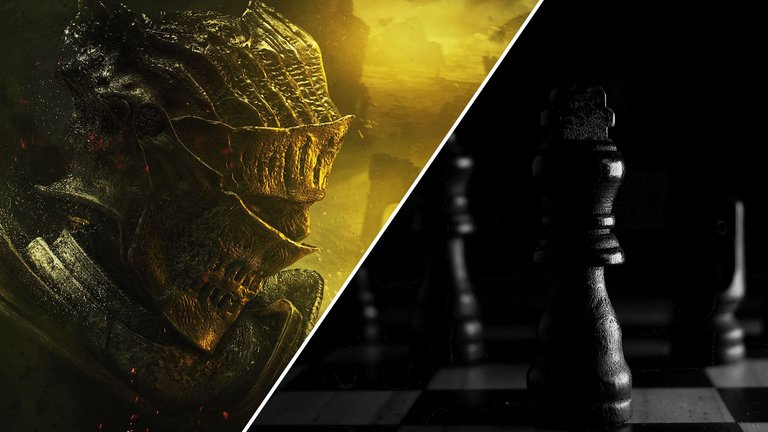
Yesterday, I started playing chess. I played a few times when I was younger, but it's been a long time since I even thought about the game. After seeing a few chess videos pop up on my YouTube feed recently, I figured I’d give it a shot and see how I’d do.
To my surprise, I didn’t do terribly. I lost quite a lot, but I also had several games that ended in a draw—both against bots and real players. And I even managed to win once or twice. That was a huge surprise, considering that just a few days ago, I barely knew what a pawn could do.
I don’t know how long my interest in chess will last, so for now, I’m playing as much as I can. However, there’s one thing I want to try—I want to improve without doing any research or studying anything about the game.
Let me go off track for a second—I love Souls games. From Dark Souls 1 all the way to Elden Ring, I love them all. These games aren’t just some of my favorites across multiple genres; they’ve also played a significant role in shaping my mindset, especially when it comes to overcoming adversity.
If you know anything about Souls games, you know their defining characteristic is their difficulty. The games are designed to make beating them a challenge. Most enemies have some kind of advantage over you—they’re faster, they deal more damage, they have more health. And then there are the bosses—powerful enemies that can kill you in one or two hits if you’re not careful and require a lot of effort to defeat.
In these games, dying is normal. If anything, not dying is unusual. Completing a Souls game without dying once is a testament to how skilled you are. And how do you get good enough to beat them?
By just playing.
One of the things I love about Souls games is that you don’t need to spend hours researching mechanics or memorizing every boss strategy to succeed. You can do that if you want, but it’s not necessary. Simply playing—and dying repeatedly—is enough.
Every enemy and every boss follows a set pattern. To defeat them, you need to learn their moves, anticipate their attacks, and find openings to strike. That’s all there is to it.
Of course, this is easier said than done. In practice, it’s much harder. Some bosses can take hours or even days to defeat, depending on your skill level. Trust me—I’ve been there.
But after playing through all of these games and finally completing Elden Ring last year, I noticed something: all those losses, all that trial and error, made me almost immune to frustration. No matter how many times I got defeated, I never got angry. Instead, I treated every loss as another step toward victory.
What I learned from Souls games is that no matter what you’re up against, you can win—given enough time and patience. All you need to do is keep facing the challenge until you overcome it.
And you will win. It might not seem like it at first, but eventually, your brain will start recognizing patterns. It will anticipate attacks and find opportunities to strike, simply because you’ve been exposed to the same scenario enough times.
It’s hard to understand this unless you’ve experienced it yourself, but here’s the idea: every failed attempt feeds your brain raw data about the enemy—how they move, their attacks, their patterns. Your brain processes that information as experience and uses it to predict their next moves. Over time, you start improving, almost instinctively.
At first, you might only chip away a small portion of a boss’s health. A few more attempts, and you can get them down to half. Eventually, you defeat them entirely. And when that happens, it feels incredible. You move forward, find the next challenge, and repeat the process.
If you play enough of these games, you’ll reach a point where you can instinctively handle bosses, even ones you’ve never faced before. You’ll still make mistakes, but you won’t be caught off guard by every attack. You’ll start dodging things you wouldn’t have even seen coming a few weeks earlier.
That’s the approach I want to take with chess—treating it as an experiment.
I know there’s a lot to learn about the game. There are countless opening moves, strategies, and techniques to memorize. People spend years studying chess to improve. But I want to see if I can get better just by playing as much as possible—by exposing my brain to raw data from hundreds of games.
If this method works for every other game I’ve played, why wouldn’t it work for chess?
Is this the smartest way to approach the game? Probably not. But I know myself—if I force myself to study theory, I’ll get bored. Worse, I’ll get frustrated when I lose, because I’ll feel like all that studying was a waste of time. I’ll even start feeling stupid—how can I still be losing after putting in the effort to learn the “right” strategies?
So, I’ll just play. A lot. As long as it’s fun, I’ll keep going. And if my theory holds up, each game will gradually improve my ability to plan moves and predict my opponent’s actions.
After all, in a way, chess is like a Souls game—you need to know when to defend, when to evade, and when to attack. And that’s something I’ve gotten pretty good at over the years.